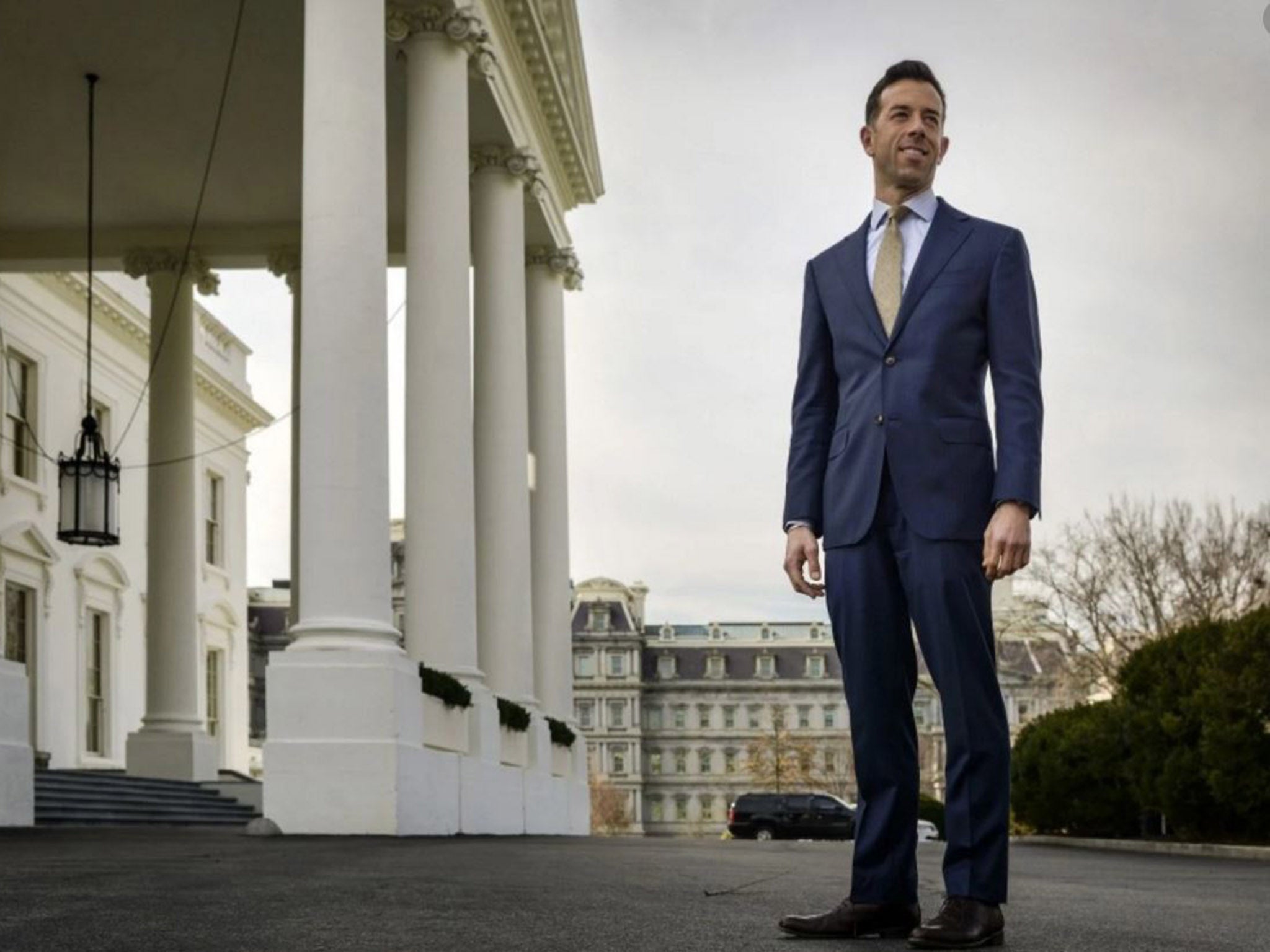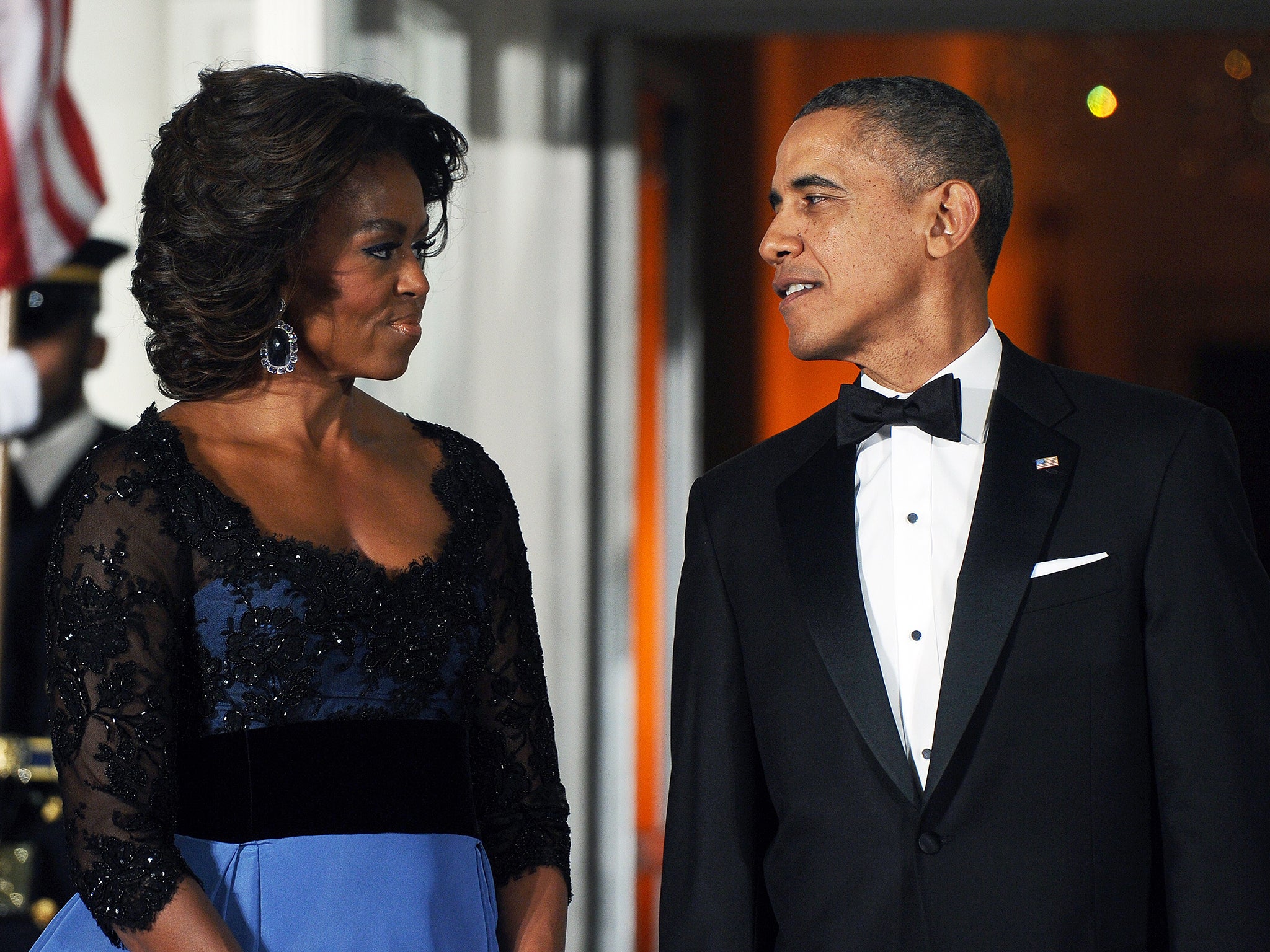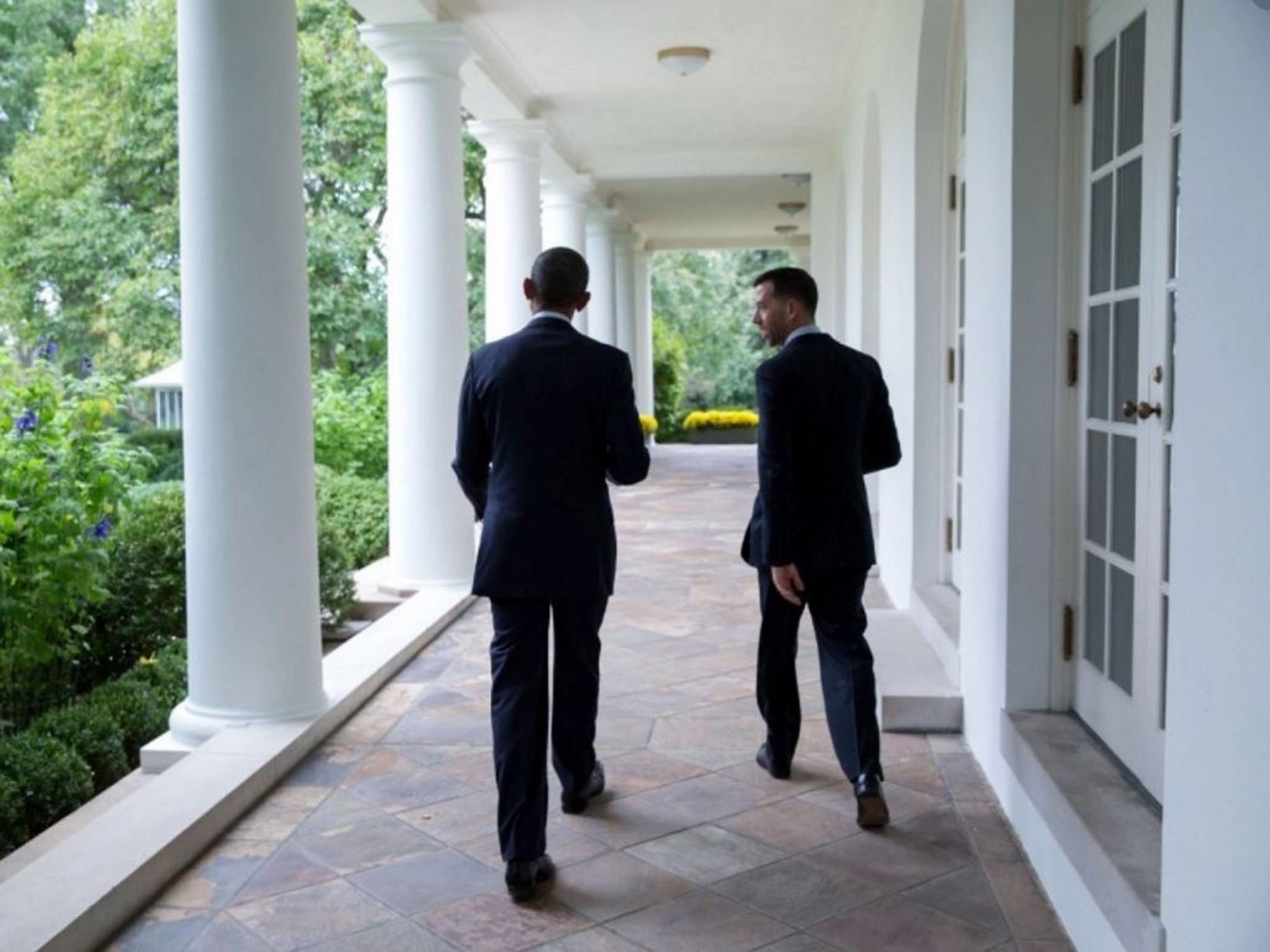Brian Mosteller: Meet the man who can basically read President Obama's mind
Mosteller’s official title is director of Oval Office operations, although a more apt name might be anticipator in chief

Your support helps us to tell the story
From reproductive rights to climate change to Big Tech, The Independent is on the ground when the story is developing. Whether it's investigating the financials of Elon Musk's pro-Trump PAC or producing our latest documentary, 'The A Word', which shines a light on the American women fighting for reproductive rights, we know how important it is to parse out the facts from the messaging.
At such a critical moment in US history, we need reporters on the ground. Your donation allows us to keep sending journalists to speak to both sides of the story.
The Independent is trusted by Americans across the entire political spectrum. And unlike many other quality news outlets, we choose not to lock Americans out of our reporting and analysis with paywalls. We believe quality journalism should be available to everyone, paid for by those who can afford it.
Your support makes all the difference.Outside the Oval Office is a small rectangular room with two side-by-side, nondescript wooden desks. In one sits President Obama’s personal secretary. In the other is Brian Mosteller, the man who sweats the small stuff so that the president doesn’t have to.
Few have even heard of Mosteller, but if you look closely at photographs taken inside the White House, you can often glimpse him at the edge of the frame, omnipresent. From his chair, he is the only person in the White House with a direct view of the president at his desk. No one gets in the Oval Office without going past him.
Mosteller’s official title is director of Oval Office operations, although a more apt name might be anticipator in chief. When Obama is in Washington, every move the president makes, every person he meets and every meeting he attends has been carefully orchestrated by Mosteller.
He knows where Obama likes his water glass placed on the table at meetings and whom he’d want to sit beside. He knows how he prefers the height of a lectern. He researches a head of state’s favorite drink so that the president can offer it. He readies Obama’s remarks and sets them, open to the first page, wherever the president will be speaking. He tells Obama when a sock is bunched at his ankle or his shirt is wrinkled, before an interview.
The president returned to Illinois last week to commemorate nine years since he announced his long-shot bid for the White House, a history-making moment of proportions few could have known then. There remain just a few people who were there in those early days.
Unlike some staffers close to the president who have enjoyed their own moments in the limelight, Mosteller, who first met Obama in Chicago after his famous speech in Springfield, Ill., to start his campaign, has intentionally stayed in the background.
Admiring colleagues refer to him as an unsung hero of the administration — the man behind the man, without whom Obama arguably would not have such a universal reputation for cool.
The low profile suits Mosteller — he needs to stay focused. The entire West Wing relies on him, and no one more than the president.
Mosteller “knows the president very well. He pays attention to everything,” said Valerie Jarrett, the president’s longtime senior adviser. “The president knows how much Brian cares about him and that it isn’t ‘I care about you from afar,’ it’s ‘I’m going to ensure the nitty-gritty details of your life from large to small are attended to.’ The president trusts him completely.”
A fascination with logistics
Mosteller brings out the president’s speech before the start of a news conference in the East Room of the White House in 2010. (AP Photo/Susan Walsh)
Disarmingly humble, Mosteller, 40, never had much interest in politics as a blood sport. Instead, as a little boy, he would watch, captivated, as President Ronald Reagan would stride up the red carpet to the podium in the East Hall to address the nation. Who is cuing the president as he speaks, he recalls wondering. What work happened behind the scenes to prepare for such an important event?
“It was something that transcended Akron, Ohio, or my small neighborhood,” he said of his fascination with protocol. The possibility of playing a behind-the-scenes role like that “was bigger than me and had the ability to affect something bigger than me.”
In college, Mosteller applied for a summer internship in the Clinton White House. He got a slot working with the advance team and ended up staying for the final two years of the administration.
He completed his last college credits remotely as he staffed the president and the first lady for domestic and international trips. He loved the exposure to the world, but he didn’t want a career in politics. He turned down a job working on Al Gore’s campaign and moved west to help prepare Salt Lake City for the 2002 Olympics.
After several years of doing logistical planning around the world for the Olympics, Mosteller settled down in Chicago in 2007. He bought a home. He was ready to put down roots.
Then he received a phone call that his state’s junior U.S. senator was going to announce his run for president. Obama planned to do two kickoff events. First, he’d speak in Springfield, Ill., where Abraham Lincoln 149 years earlier announced his candidacy. Then he’d come to Chicago.
Could Mosteller help plan the second event?
He accepted the temporary job, but he made it clear that he had little interest in ever leaving Chicago.
Then he met Obama.
It wasn’t the young politician’s oratory skills that drew Mosteller in, though he was as impressed with those as most of America was back then. It was something intangible that Mosteller now has trouble describing. There was a kindness, an authenticity, he said, that made him want to give up everything to join the shoestring campaign.
By the 2008 convention, Mosteller had transitioned to the job he has pretty much had ever since: To be Obama’s eyes and ears. To see every event from Obama’s perspective. To be the president’s fiercest advocate.
On election night 2008, Mosteller waited in the loading dock of the Hyatt Regency hotel in Chicago for the president-elect. He escorted the Obamas to the hotel room where their core campaign team had just watched his decisive victory. And he escorted them back down the elevator to go to Grant Park, where the man just elected would greet more than 200,000 cheering fans.
.jpg)
Obama was quiet and reflective that night. Mosteller knew to give him space. He knew when to ask the Time magazine photographer to stop flashing the camera. He helped decide when it was appropriate to put him on the phone with the man he had just beat, Sen. John McCain (R-Ariz.).
But he didn’t quite have everything about the man down pat yet.
On the elevator ride back down, Mosteller briefed Obama on how the victory speech would go — an event he’d helped organise.
“And then the fireworks are going to go off,” Mosteller began.
“No fireworks,” Obama said. That would be too ostentatious.
Mosteller didn’t flinch, even though at that moment, a freighter from Indiana was waiting in a lake to set them off. He called the crew and told them they could go home.

“I agreed with him,” Mosteller said. “I’m there to make whatever he wants happen. … There were these enormous pressures descending on this man and this family. I take away the small pressures with which I can contend so he can focus on the more massive.”
Mosteller was once compared in a magazine feature to Gary, the bumbling, insecure personal assistant to the president on the HBO series “Veep.” But the unflappable, exacting Mosteller is nothing like that caricature, his colleagues say.
Reggie Love, Obama’s body man until 2011, remembers the president asking him once how to pronounce a word. When Love told him, Obama seemed incredulous. “Well, let’s ask Brian,” Love recalls the president saying.
“When you see how much time and preparation and work Brian puts in to ensure everything goes off seamlessly, you have no choice but to trust someone like that,” Love said.
‘How often does a boss talk about love?’
Mosteller, a handsome man, tall and slim with thick, dark hair and light eyes, arrives to his clutterless desk at least an hour before the president every morning, unlocking the door just off the Rose Garden that Obama enters through. He makes sure to fill the monogrammed water bowl for his best bud, Bo, the first dog, who comes to play.

As they await the president’s arrival, Mosteller and Obama’s personal secretary, Ferial Govashiri, will often turn on music and sing together. (Yes, he does have a lighter side — of all the celebrities that have passed through the White House, Mosteller, a huge Muppets fan, was most excited to meet Miss Piggy. Maybe even a little star-struck.)
After Obama has left for the day, Mosteller is still there to turn off the lights and lock up, as if the Oval Office were a small storefront.
In between the president’s arrival and departure, Mosteller doesn’t miss a beat.
Recently, Obama joined a cancer research roundtable at the White House. He was meant to give remarks and stay for about 45 minutes. Mosteller was going over the schedule and realised that there was no clear exit time for the president, who couldn’t just walk out in the middle of such an emotionally heavy discussion. So Mosteller massaged the timing so there would be an obvious break for Obama to excuse himself. Anything to keep the president’s day running smoothly.
By this time, so late into Obama’s presidency, Mosteller said there is a comfort that comes from working alongside someone for so many years. He knows his boss’s quirks; he senses his moods.
“The president takes comfort having someone like Brian around,” said Josh Earnest, the White House press secretary. “The president is somebody who doesn’t mind jokingly giving someone a hard time. Brian has the comfort level and the stature to give it back to him — at least a little bit.”
Like any two co-workers with neighboring offices, Mosteller is the person whom Obama wanders by to chat casually with or vent to during the day. They may joke with each other about a long-winded visitor or Washington’s response to snow. And Mosteller has more freedom than just about anyone to go into the Oval Office unannounced.
One morning in the middle of a daily briefing in June 2015, Mosteller burst through the door to personally deliver the news that the Supreme Court had upheld a key provision of the Affordable Care Act.
Obama raised his right arm in the air, a moment captured for posterity by the White House photographer.

But there is another, perhaps even more indelible memory for Mosteller — the morning after, when the Supreme Court legalised gay marriage. Mosteller, who since got engaged, had been open with the president about his sexual orientation since the early days of the campaign.
After the decision was announced, the president walked in through the door to the outer Oval Office, where Mosteller works, and silently put his arm around him.
The magnitude of the moment “was unspoken,” Mosteller said.
Mosteller was also in the room in 2012 when Obama affirmed his support for gay marriage during an interview with ABC’s Robin Roberts. When Obama finished, he asked Mosteller how he did.
Mosteller’s eyes welled with tears, and he wondered whether his closeness with the president had in some small way influenced Obama’s thinking.
“When I was young, I couldn’t fathom that I could ever have a partner, and now I was with the president of the United States and, together, we were talking this kind of partnership, and it was not only public but so very normal,” Mosteller said. “How often does a boss talk about love? Now, how often does a boss contribute to our country’s blessing of your love?”
The lesson of resilience
Reflecting on Obama’s two campaigns and his presidency, and all the people who have come through the Oval Office, Mosteller said he has learned how resilient people are. He has witnessed Obama weather the many stresses of the presidency, as he has weathered his own job supporting him. He has watched as the American people have borne economic and other hardships.
This lesson of resilience will stay with him long after this experience in the White House is over, he said.
“A person can handle anything,” he said. “That person could be the president of the United States, a bus driver, an unemployed mother of four, a young volunteer, a child with a disability or myself. For the most part, what holds us back is within us. The other parts — that’s where your community and, in some cases, the government can come in to assist.”
Possessed of this larger perspective, few things can upset him now, Mosteller said. His high-stakes job has shown him that people can surmount life’s challenges and come out better people on the other end.
“In a way, that sentiment makes the world seem smaller because there’s no place or person or project or adventure that seems too daunting,” he said.
Nine years ago, he went with his gut. What comes next is unknown, and he’s fine, even excited, by that.
But for now, there’s still 10 more months. And Obama needs him.
Copyright: Washington Post
Join our commenting forum
Join thought-provoking conversations, follow other Independent readers and see their replies
Comments